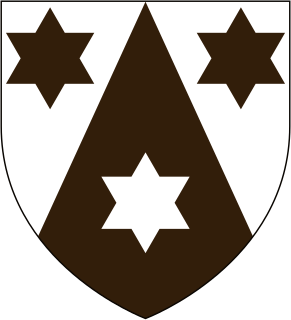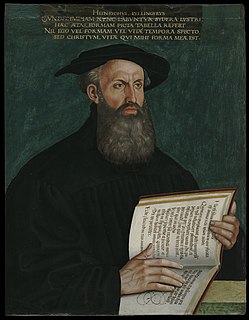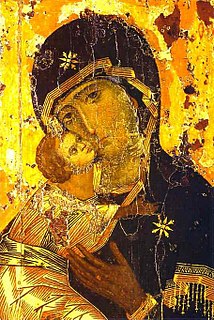
In Christian theology, the Immaculate Conception is the conception of the Virgin Mary free from original sin by virtue of the merits of her son Jesus. The Catholic Church teaches that God acted upon Mary in the first moment of her conception, keeping her "immaculate".

The Order of the Brothers of the Blessed Virgin Mary of Mount Carmel or Carmelites is a Roman Catholic mendicant religious order founded, probably in the 12th century, on Mount Carmel in the Crusader States, hence the name Carmelites. However, historical records about its origin remain very uncertain. Berthold of Calabria has traditionally been associated with the founding of the order, but few clear records of early Carmelite history have survived.

Heinrich Bullinger was a Swiss reformer, the successor of Huldrych Zwingli as head of the Zürich church and pastor at Grossmünster. A much less controversial figure than John Calvin or Martin Luther, his importance has long been underestimated; recent research shows that he was one of the most influential theologians of the Protestant Reformation in the 16th century.

Johannes Oecolampadius was a German Protestant reformer in the Reformed tradition from the Electoral Palatinate. He was the leader of the Protestant faction in the Baden Disputation of 1526, and he was one of the founders of Protestant theology, engaging in disputes with Erasmus, Zwingli, Luther and Martin Bucer. He eventually adopted Zwingli's view on the eucharist dispute.

The Assumption of Mary into Heaven is, according to the beliefs of the Catholic Church, Eastern and Oriental Orthodoxy, the bodily taking up of the Virgin Mary into Heaven at the end of her earthly life.

The New Testament describes James, Joseph (Joses), Judas (Jude), and Simon as brothers of Jesus. Also mentioned, but not named, are sisters of Jesus. Some scholars argue that these brothers, especially James, held positions of special honor in the early Christian church.

The perpetual virginity of Mary is a Marian doctrine, taught by the Catholic Church and held by a number of groups in Christianity, which asserts that Mary was "always a virgin, before, during and after the birth of Jesus Christ." This doctrine also proclaims that Mary had no marital relations after Jesus' birth nor gave birth to any children other than Jesus. While the Bible mentions brothers of Jesus, Catholic, Orthodox, and some traditional Protestant interpretations offer various explanations that align with the doctrine of Mary's perpetual virginity; that these siblings were either children of Joseph from a previous marriage, cousins of Jesus, or were closely associated with the Holy Family.

Salome, or Mary Salome, was a follower of Jesus who appears briefly in the canonical gospels and in more detail in apocryphal writings. She is named by Mark as present at the crucifixion and as one of the women who found Jesus's tomb empty. Interpretation has further identified her with other women who are mentioned but not named in the canonical gospels. In particular, she is often identified as the wife of Zebedee, the mother of James and John, two of the Apostles of Jesus. In Roman Catholic tradition Salome is, or at least was in the Middle Ages, counted as one of the Three Marys who were daughters of Saint Anne, so making her the sister or half-sister of Mary, mother of Jesus.

Matthew 1 is the first chapter of the Gospel of Matthew in the New Testament. It contains two distinct sections. The first lists the genealogy of Jesus from Abraham to his legal father Joseph, his mother's husband. The second part, beginning at verse 18, provides an account of the virgin birth of Jesus Christ.

In Roman Catholic Mariology, the title Mediatrix refers to the intercessory role of the Blessed Virgin Mary as a mediator in the salvific redemption by her son Jesus Christ, and that he bestows graces through her. Mediatrix is an ancient title that has been used by a number of saints since at least the 5th century. Its use grew during the Middle Ages and reached its height in the writings of saints Louis de Montfort and Alphonsus Liguori in the 18th century.

Gautier de Coincy (1177–1236) was a French abbot, poet and musical arranger, chiefly known for his devotion to the Virgin Mary.

Protestant views on Mary include the theological positions of major Protestant representatives such as Martin Luther and John Calvin as well as some modern representatives. While it is difficult to generalize about the place of Mary, mother of Jesus in Protestantism given the great diversity of Protestant beliefs, some summary statements are attempted.

The history of Catholic Mariology traces theological developments and views regarding Mary from the early Church to the 21st century. Mariology is a mainly Catholic ecclesiological study within theology, which centers on the relation of Mary and the Church. Catholic Mariology is the encyclopedic area of theology concerned with Mary, the Mother of God. Theologically, it not only deals with her life, but her veneration in daily life, prayer, art, music, architecture, in modern and ancient Christianity throughout the ages.

Throughout history Roman Catholic Mariology has been influenced by a number of saints who have attested to the central role of Mary in God's plan of salvation. The analysis of Early Church Fathers continues to be reflected in modern encyclicals. Irenaeus vigorously defended the title of "Theotokos" or Mother of God. The views of Anthony of Padua, Robert Bellarmine and others supported the doctrine of the Immaculate Conception of the Virgin Mary, which was declared a dogma in 1850.

The Mariology of the popes is the theological study of the influence that the popes have had on the development, formulation and transformation of the Roman Catholic Church’s doctrines and devotions relating to the Blessed Virgin Mary.

John Calvin (1509–1564) was a French Protestant theologian during the Protestant Reformation, and one of the most influential reformers. He was a central figure for the Reformed churches, whose theological system is sometimes called Calvinism.

Luther's Marian theology is derived from his views of Mary, the mother of Jesus. It was developed out of the deep Christian Marian devotion on which he was reared, and it was subsequently clarified as part of his mature Christocentric theology and piety. Lutherans hold Mary in high esteem. Martin Luther dogmatically asserted what he considered firmly established biblical doctrines like the divine motherhood of Mary while adhering to pious opinions of the Immaculate Conception and the perpetual virginity of Mary along with the caveat that all doctrine and piety should exalt and not diminish the person and work of Jesus Christ. By the end of Luther's theological development, his emphasis was always placed on Mary as merely a receiver of God's love and favor. His opposition to regarding Mary as a mediatrix of intercession or redemption was part of his greater and more extensive opposition to the belief that the merits of the saints could be added to those of Jesus Christ to save humanity.

Le pèlerinage de Lourdes is the only encyclical of Pope Pius XII issued in French. It includes warnings against materialism on the centenary of the apparitions at Lourdes. It was given at Rome, from St. Peter's Basilica, on the feast of the Visitation of the Most Holy Virgin, July 2, 1957, the nineteenth year of his pontificate.

The following outline is provided as an overview of and topical guide to the Catholic Church:




















